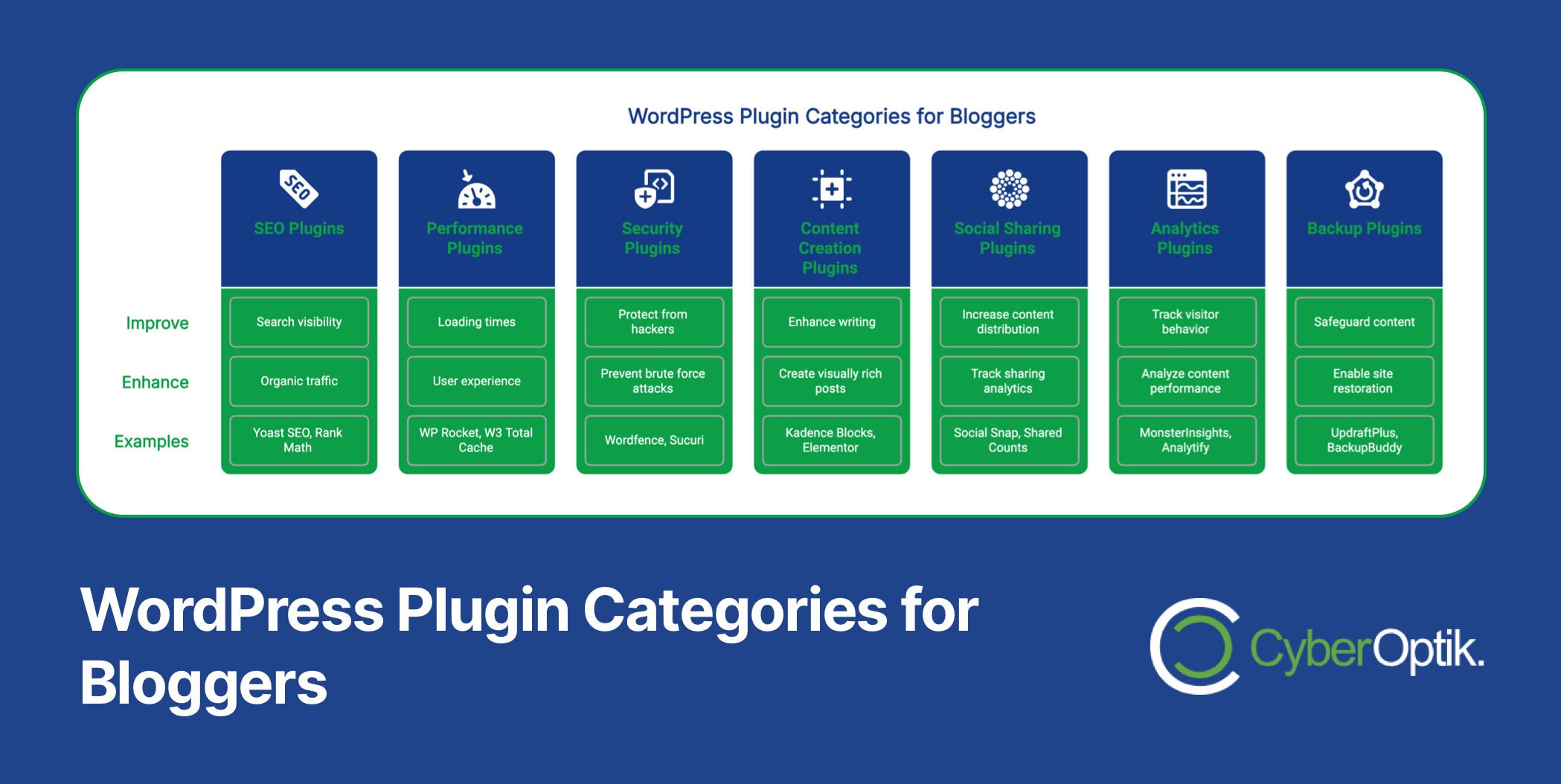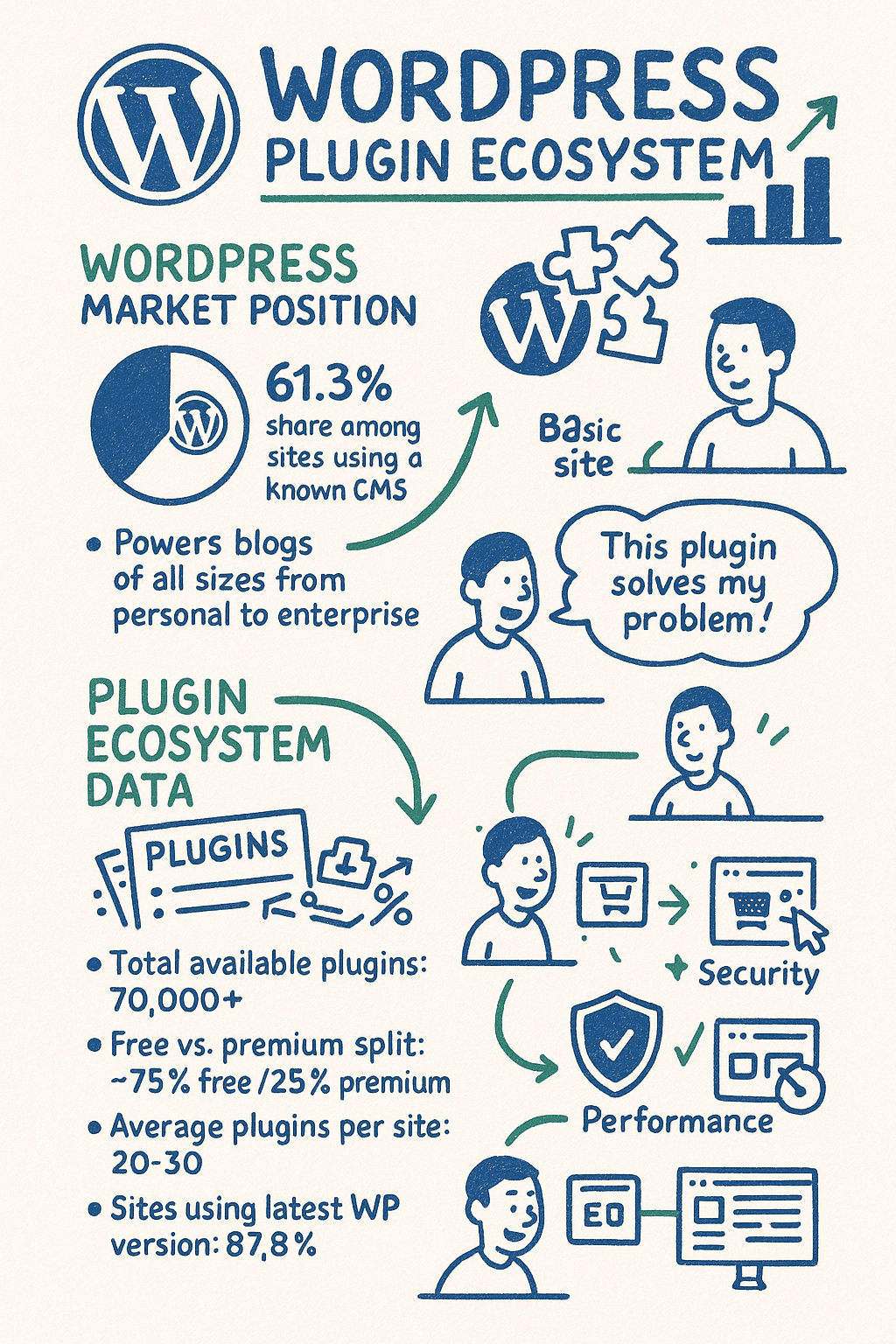Building a successful WordPress blog requires more than just great content. The right plugins can transform your blog from good to exceptional by adding features that enhance user experience, improve security, boost performance, and increase visibility.
As a web design and development agency, we’ve helped numerous clients select and implement the perfect plugins for their WordPress blogs. We understand the challenges of choosing from over 30,000 available plugins and themes in the WordPress repository.
This guide outlines the essential WordPress plugins that every serious blogger needs to succeed. We’ll cover tools for SEO, performance, security, content creation, social sharing, analytics, and backups.

Why the Right WordPress Plugins Matter for Bloggers
WordPress dominates the content management system market with a remarkable 61.3% share among sites using a known CMS. (Source: DiviFlash)
This popularity stems from WordPress’s flexibility and extensibility through plugins. These powerful tools allow bloggers to add features that would otherwise require custom coding or expensive development.
The right mix of plugins can significantly impact your blog’s success. They enhance both the front-end experience for readers and the back-end management for content creators.
| WordPress Plugin Statistics | Value | Impact for Bloggers |
|---|---|---|
| Total Available Plugins | 70,000+ | Wide selection for any blogging need |
| Free vs. Premium Split | ~75% Free / 25% Premium | Options for all budget levels |
| Average Plugins Per Site | 20-30 | Balance between functionality and performance |
| Sites Using Latest WP Version | 87.8% | Plugin compatibility with current core |
The plugin statistics above highlight why WordPress remains the platform of choice for bloggers who want flexibility without technical complexity. (Source: Barn2)

When selecting plugins for your blog, focus on these essential categories:
- SEO plugins – Improve search visibility and organic traffic
- Performance plugins – Speed up loading times and enhance user experience
- Security plugins – Protect your blog from hackers and malware
- Content creation plugins – Enhance your writing and publishing process
- Social sharing plugins – Increase content distribution across networks
- Analytics plugins – Track visitor behavior and content performance
- Backup plugins – Safeguard your content and database
Now let’s examine the best plugins in each category that can take your WordPress blog to the next level.
Essential SEO Plugins for WordPress Blogs
A well-optimized blog attracts more organic traffic, which is why having a well-optimized WordPress site is critical for business growth. SEO plugins make it easier to optimize your content for search engines.
When choosing an SEO plugin, look for these key features:
- Content analysis tools that guide optimization
- Metadata and schema markup controls
- XML sitemap generation
- Readability analysis
- Social media integration
Here are our top recommendations for WordPress SEO plugins:
Yoast SEO

Yoast remains the most popular SEO plugin with good reason. It offers comprehensive SEO tools that help optimize your content with real-time page analysis, readability checks, and metadata management.
Yoast provides color-coded recommendations that make optimization straightforward even for beginners. The premium version adds internal linking suggestions, redirect management, and multiple keyword optimization.
Rank Math

Rank Math has quickly gained popularity as a feature-rich alternative to Yoast. It combines the functionality of several plugins into one package with an intuitive interface.
Rank Math offers advanced schema markup options, Google Search Console integration, and 404 monitoring. Its free version provides features that are often premium in other SEO plugins.
All in One SEO Pack

All in One SEO Pack is a veteran in the WordPress plugin ecosystem with a strong focus on simplicity and performance. It’s an excellent choice for bloggers who want effective SEO tools without overwhelming complexity.
The plugin offers TruSEO scoring, smart XML sitemaps, and social media integration. Its clean interface makes it accessible for beginners while providing advanced options for experienced users.
| SEO Plugin | Best For | Free Version Strength | Premium Value |
|---|---|---|---|
| Yoast SEO | Bloggers who want detailed content optimization guidance | Complete on-page SEO tools | Internal linking suggestions |
| Rank Math | Feature-hungry users who want an all-in-one solution | Rich schema options | Keyword rank tracking |
| All in One SEO | Beginners seeking simplicity without sacrificing power | User-friendly interface | SEO for custom post types |
Our experience shows that the right SEO plugin can significantly impact your blog’s search visibility. Most blogs see improvements within 2-3 months of proper implementation.
Crucial Performance Optimization Plugins
Site speed directly impacts user experience, search rankings, and conversion rates. Performance optimization plugins help your blog load faster and run more efficiently.
What makes WordPress plugins so powerful for business websites is their ability to implement technical optimizations without requiring deep technical knowledge.
Here are the top performance plugins for WordPress blogs:
WP Rocket

WP Rocket is a premium caching plugin that stands out for its simplicity and effectiveness. It works immediately upon activation with smart defaults that improve site speed without complex configuration.
Key features include page caching, browser caching, GZIP compression, and lazy loading for images. It also offers database optimization and CDN integration.
W3 Total Cache
W3 Total Cache is a robust free alternative that provides extensive caching options. While it has a steeper learning curve, it offers tremendous flexibility for performance tuning.
The plugin includes page, browser, object, and database caching. It also supports minification of HTML, CSS, and JavaScript files to reduce load times.
Smush
Smush focuses on image optimization, a critical aspect of blog performance. Large, unoptimized images are often the biggest culprits in slow-loading pages.
The plugin automatically compresses images upon upload, strips unnecessary metadata, and offers lazy loading. The pro version adds WebP conversion and more aggressive compression options.
| Performance Plugin | Average Speed Improvement | Ease of Setup | Best Feature |
|---|---|---|---|
| WP Rocket | 40-60% faster loading | Very Easy (works instantly) | Intelligent preloading |
| W3 Total Cache | 30-50% faster loading | Complex (many options) | Granular caching control |
| Smush | 20-30% faster loading | Easy (automatic processing) | Bulk optimization of existing images |
We typically recommend WP Rocket for most bloggers due to its balance of power and simplicity. However, W3 Total Cache offers more control for technically inclined users who want to fine-tune every aspect of caching.
Must-Have Security Plugins for WordPress Blogs
WordPress blogs face constant security threats. With security threats against WordPress sites increasing each year, protection plugins have become essential for bloggers of all sizes.
Common security threats WordPress blogs face include:
- Brute force login attempts
- Malware injection
- SQL injection attacks
- Cross-site scripting (XSS)
- Outdated plugin vulnerabilities
Here are the top security plugins that help protect your WordPress blog:
Wordfence Security

Wordfence is a comprehensive security solution that includes a web application firewall (WAF), malware scanner, and real-time threat defense feed. It blocks malicious traffic before it reaches your site.
The plugin offers login security features, live traffic monitoring, and security alerts. The premium version provides real-time firewall rule and malware signature updates.
Sucuri Security
Sucuri offers excellent security hardening, malware scanning, and post-hack tools. Its activity auditing helps track changes to your site that might indicate a compromise.
The premium version adds a cloud-based WAF that blocks attacks at the network level before they reach your server. This approach minimizes the performance impact on your site.
SolidWP
SolidWP (formerly iThemes Security) focuses on fixing WordPress vulnerabilities and implementing recommended security practices. It offers over 30 ways to secure and protect your WordPress site.
Features include two-factor authentication, strong password enforcement, and brute force protection. The pro version adds scheduled malware scanning, user security checks, and password expiration.
| Security Feature | Wordfence | Sucuri | iThemes |
|---|---|---|---|
| Firewall Protection | Endpoint WAF | Cloud-based WAF (premium) | Basic blocking |
| Malware Scanning | ✓ | ✓ | ✓ (Pro only) |
| Login Protection | ✓ | Limited | ✓ |
| File Integrity | ✓ | ✓ | ✓ |
| Post-Hack Tools | Limited | ✓ | Limited |
For most bloggers, we recommend starting with Wordfence’s free version, which provides excellent protection against common threats. As your blog grows, consider upgrading to a premium security solution for additional peace of mind.
Best Content Creation and Editing Plugins
Content creation plugins enhance your ability to produce engaging, visually appealing blog posts. They extend WordPress’s native editor with additional features and formatting options.
Here are the top content creation plugins for WordPress bloggers:
Gutenberg Blocks by Kadence

Kadence Blocks extends the WordPress block editor with additional blocks and options that give you more control over your content’s appearance. It’s perfect for bloggers who want to create visually rich posts without knowing HTML or CSS.
The plugin offers row layouts, advanced headings, buttons, tabs, and accordions. The pro version adds even more blocks, including modal popups and product carousels.
Elementor
Elementor is a visual page builder that transforms how you create content in WordPress. It uses a drag-and-drop interface that makes complex layouts accessible to non-technical users.
While primarily known as a page builder, many bloggers use Elementor for creating stunning blog post layouts with features like multi-column text, custom image galleries, and call-to-action sections.
Advanced Custom Fields
Advanced Custom Fields (ACF) is a developer-friendly plugin that allows you to add custom fields to your WordPress posts. This enhances your content structure with additional data points that can be displayed in your theme.
For serious bloggers, ACF enables consistent formatting for specific content types, such as book reviews with ratings, recipe cards with ingredients and instructions, or product reviews with standardized evaluation criteria.
The right content creation plugins make it easier to produce professional-looking blog posts that engage readers and keep them on your site longer.
Top Social Media Sharing Plugins
Social media sharing is essential for expanding your blog’s reach and building an audience. The right plugin makes it easy for readers to share your content across platforms.

Here are our recommended social media plugins for WordPress:
Social Snap

Social Snap offers attractive sharing buttons with share counts, click-to-tweet functionality, and automatic post to social networks. Its modern design and performance focus make it a top choice for style-conscious bloggers.
The plugin includes analytics to track which posts get shared most often and on which platforms. This data helps refine your content strategy over time.
Shared Counts
Shared Counts is a lightweight, performance-focused social sharing plugin. It’s perfect for bloggers who want essential sharing functionality without the bloat that comes with some other social plugins.
The plugin offers clean, minimal sharing buttons with accurate share counts. Its emphasis on speed makes it ideal for blogs that prioritize performance.
Grow by Mediavine
Grow (formerly Social Pug) offers well-designed sharing buttons for popular networks, including Pinterest, which is crucial for blogs with visual content. The buttons can be placed in multiple locations, including floating sidebars and inline within content.
The premium version adds social sharing analytics, click-to-tweet functionality, and additional button locations. Its Pinterest-specific features make it especially valuable for lifestyle, food, and craft bloggers.
| Social Plugin | Performance Impact | Design Options | Standout Feature |
|---|---|---|---|
| Social Snap | Medium | Extensive | Advanced analytics |
| Shared Counts | Minimal | Basic | Speed optimization |
| Grow | Low-Medium | Good | Pinterest optimization |
The best social sharing plugin depends on your blog’s specific needs. Image-heavy blogs benefit most from Pinterest-focused solutions like Grow, while performance-conscious blogs might prefer Shared Counts’ lightweight approach.
Essential Analytics and Tracking Plugins
Understanding your audience is crucial for blog growth. Analytics plugins help you track visitor behavior, content performance, and conversion metrics.
MonsterInsights

MonsterInsights is the most popular Google Analytics plugin for WordPress. It makes complex analytics data accessible within your WordPress dashboard through simplified reports and insights.
The plugin offers real-time stats, enhanced eCommerce tracking, and form conversion tracking. Its setup wizard makes it easy to implement Google Analytics correctly without editing code.
Analytify
Analytify is another excellent Google Analytics plugin with beautiful, easy-to-understand reports. It shows your most popular posts, audience demographics, and traffic sources directly in your WordPress dashboard.
The plugin includes enhanced link attribution and scroll tracking. The pro version adds WooCommerce integration, custom dimensions, and more detailed reports.
WP Statistics
WP Statistics is a standalone analytics solution that doesn’t require Google Analytics. It stores all data in your WordPress database, making it a good option for blogs with privacy concerns.
The plugin provides real-time stats, geolocation data, and detailed visitor logs. Since it doesn’t rely on external services, it avoids issues with ad blockers that might filter Google Analytics tracking.
Analytics plugins provide crucial insights that help you create more targeted content based on what your audience responds to best.
Best Backup and Migration Plugins
Regular backups are essential for protecting your blog content. The concept of regular and reliable WordPress backups should be central to your maintenance strategy.
UpdraftPlus

UpdraftPlus is the most popular WordPress backup plugin, and for good reason. It offers automated scheduled backups, cloud storage integration, and one-click restoration.
The plugin backs up your entire WordPress site, including files and database. It supports multiple cloud storage options including Dropbox, Google Drive, and Amazon S3.
BackupBuddy
BackupBuddy was one of the first premium WordPress backup plugins and remains a top choice for many bloggers. It offers complete backup solutions with scheduling, storage options, and easy restoration.
One of BackupBuddy’s standout features is its migration capability, which makes it easy to move your blog to a new host or domain. This dual functionality makes it particularly valuable.
WP Time Capsule
WP Time Capsule takes a different approach to backups. Instead of creating full backups each time, it incrementally backs up only changed files, which saves storage space and processing power.
The plugin creates a timeline of changes to your site, allowing you to restore to any specific point. This granular restoration capability can be invaluable if you need to undo specific changes.
Gallery Enhancement
Looking to showcase your visual content? Explore our guide to top WordPress gallery plugins that can transform your media presentation.
How to Choose the Right Plugins for Your WordPress Blog
Selecting the right plugins for your blog requires careful consideration. Too many plugins can slow down your site, while poorly coded ones may create security vulnerabilities.
Consider these factors when selecting WordPress plugins:
- Updates and maintenance – Choose plugins that receive regular updates
- Reviews and ratings – Look for plugins with positive feedback from users
- Support availability – Ensure developers respond to support requests
- Performance impact – Test how the plugin affects your site speed
- Compatibility – Verify it works with your WordPress version and other plugins
Warning signs that should make you reconsider a plugin:
- Not updated in over 6 months
- Poor reviews mentioning security issues
- Compatibility warnings with your WordPress version
- Excessive feature bloat beyond what you need
- Lack of documentation or support
We recommend testing new plugins on a staging site before adding them to your live blog. This allows you to identify any conflicts or performance issues before they affect your readers.
Remember that the quality of your plugins is more important than quantity. A few well-chosen, high-quality plugins will serve you better than dozens of mediocre ones.
Conclusion
The right WordPress plugins can dramatically improve your blog’s functionality, user experience, and performance. By focusing on essential tools for SEO, speed, security, content creation, social sharing, analytics, and backups, you’ll build a solid foundation for blogging success.
Start by identifying your blog’s specific needs, then select quality plugins that address those requirements without unnecessary bloat. Regularly review your plugin collection to ensure everything installed serves a clear purpose.
Remember that plugin quality and compatibility matter more than quantity. A streamlined set of well-maintained plugins will give your WordPress blog the features it needs while maintaining optimal performance and security.
Ready to take your WordPress blog to the next level? Implement these plugin recommendations and watch your site transform into a more powerful, effective publishing platform.




